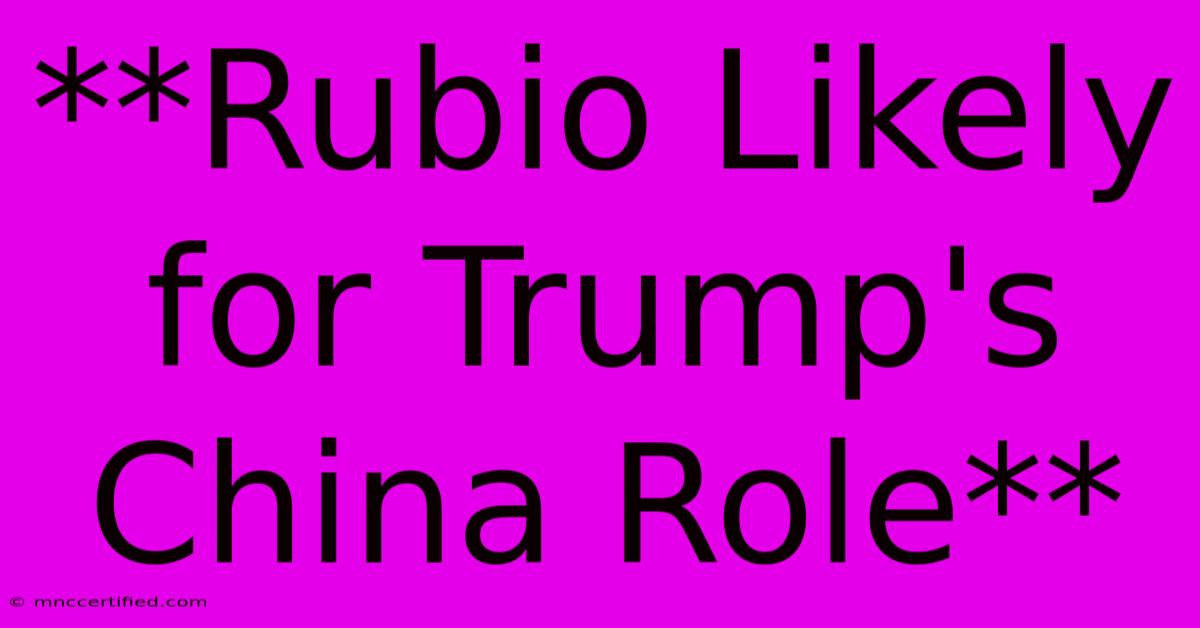**Rubio Likely For Trump's China Role**

Table of Contents
Rubio Likely for Trump's China Role: A Deep Dive into the Potential Implications
As the 2024 Presidential election draws nearer, speculation is mounting about who former President Donald Trump may choose for key roles in his potential administration. One name that has been consistently floated for the position of National Security Advisor, or perhaps even Secretary of State, is Senator Marco Rubio (R-FL). This choice carries significant weight given the complex and increasingly tense relationship between the United States and China.
Rubio's Stance on China
Rubio has long been a vocal critic of China's economic and political practices, particularly its aggressive actions in the South China Sea and its human rights abuses. He has consistently pushed for a tougher stance on China, advocating for increased military spending and a more assertive approach to trade negotiations.
The Potential for Increased Tensions
Rubio's appointment could signal a return to the "America First" foreign policy that characterized Trump's first term. This could lead to further escalation of tensions with China, potentially in the form of:
- Increased tariffs: Rubio has supported Trump's previous trade wars with China, and could push for even more aggressive measures.
- Military buildup: The US military could see increased investment in the Indo-Pacific region, potentially leading to a more confrontational posture towards China.
- Political pressure: Rubio's appointment could embolden lawmakers to take a more aggressive stance on China, leading to further diplomatic friction.
Beyond the Headlines: A Deeper Look at the Implications
While Rubio's appointment would undoubtedly raise the stakes in US-China relations, it's important to consider the broader implications.
- Impact on US businesses: Increased tariffs and trade restrictions could negatively affect American businesses with operations in China.
- Global security concerns: Escalating tensions could have unpredictable consequences for global stability and security.
- Potential for cooperation: Despite the rhetoric, there remain areas where the US and China can cooperate, such as on issues of climate change and global health.
The Future of US-China Relations
The appointment of Marco Rubio as a key advisor in a potential Trump administration would undoubtedly have significant consequences for US-China relations. It is crucial to understand the potential ramifications of this decision, both for the US and the global community. While Rubio's appointment could lead to increased tensions, it also presents opportunities for dialogue and cooperation on critical global issues. Ultimately, the future of US-China relations will depend on the choices made by both countries' leaders.
Beyond this article:
- Research further into the history of US-China relations, exploring key turning points and current challenges.
- Analyze the economic and geopolitical implications of a potential Rubio appointment.
- Consider alternative perspectives and explore the potential for diplomatic solutions and cooperation between the US and China.
Remember: Stay informed, stay engaged, and contribute to a deeper understanding of the complexities of US-China relations.

Thank you for visiting our website wich cover about **Rubio Likely For Trump's China Role**. We hope the information provided has been useful to you. Feel free to contact us if you have any questions or need further assistance. See you next time and dont miss to bookmark.
Featured Posts
-
Watch Appraisal For Insurance Onine
Nov 13, 2024
-
Gavin Casalegno Ties The Knot Summer I Turned Pretty Star
Nov 13, 2024
-
Aortic Stenosis Life Insurance Rate
Nov 13, 2024
-
Flaggs Cramps Stress Duke Staff
Nov 13, 2024
-
Pjc Insurance Agency Springfield Mo
Nov 13, 2024